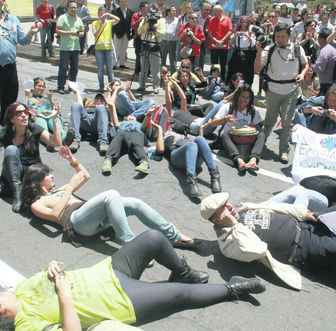Yasuní oil production could be biggest issue in the August election; Lasso might reconsider his election options; ‘Where’s the money?’ city officials ask
The National Elections Council’s decision to include a referendum question that could end oil production in the Yasuní National Park could have a major impact on the presidential and National Assembly elections, environmental activists and political analysts say.
analysts say.
“Not much attention has been paid to the Yasuní issue, since the focus is on the presidential and Assembly races, but it could have a significant impact on the outcomes,” says Milton Ortiz, former Assemblyman and university lecturer. “A vote to end production could negatively affect the Correista candidates and could cost the government billions of dollars in revenue.”
The decision to combine the Yasuní question on the national election ballot was economic, says CNE member Elena Nájera “The Constitutional Court ordered us to hold the consultation and by combining it with the cross death election we will save the taxpayers $50 million.”

Protesters block a Quito street in 2015 following the government’s decision to stop a referendum that would have prevented oil production in the Yasuní National Park.
According to Ortiz, environmentalists blame former president Rafael Correa for preventing a public vote on Yasuní oil drilling in 2014. “The investigations showed that the Correa government committed fraud in rejecting petitions that would have allowed the consultation and this issue will certainly come up in the election,” he said. “There is a tremendous amount of anger about what happened, and this will spill over into the campaigns for president and the Assembly.”
On May 8, the Constitutional Court ruled that rejection of Yasuní referendum petitions in 2014 was “unlawful” and that the referendum should have been allowed.
The Yasunidos Collective said Monday it is “very happy” the referendum will be part of the August 20 election. “We have waited for years for this, and justice has finally been done,” said Yasunidos spokesman Pedro Bermeo. “We didn’t think the question would go to voters this soon but the cross death has made it possible.”
Bermo says that Collective members are focusing on the referendum, not the election for president and Assembly. “It is true that this could hurt the Correista candidates for their association with Rafael Correa but that is not our concern today. We want to make our case based on the facts and hope we have the support we had 10 years ago.”
In 2014, polls showed strong support for stopping oil exploration and production in the Yasuní Park. “More than 60% of the voters favored preserving the Yasuní and the government stopped the consultation because they knew they would lose and be embarrassed.”
Beyond legal issues surrounding the referendum, Ortiz said the government is “scared to death” it might be forced to end production in the park. “This would be a massive blow from a revenue standpoint since almost 20% of all oil income comes from Yasuní,” he says. “Very easily this referendum could be more important to the future of Ecuador than who is elected president and who controls the Assembly.”
Lasso reconsiders decision not to run, reports say
According to several social media posts, President Guillermo Lasso is reconsidering his earlier position that he would not run for reelection. The anonymous posts by sources “inside the government” claim that Lasso has been “encouraged to rethink his position” based on recent polls showing an increase in his popularity.
In interviews last week with CNN and the Washington Post, Lasso said he would not be a candidate in the August election and intended to step down at the end of the cross death period.
In three recent political polls, Lasso gained between six and 12 percentage points in popularity. The polls also showed the public disagreed with the National Assembly’s attempt to impeach him by a two-to-one margin.
‘Where’s the money,’ new city government asks
Cuenca’s new financial director is claiming the administration of former mayor Pedro Palacios has left the city’s economic cupboard bare.
“He said he left a $150 million surplus in municipal accounts but all we find is a $28 million deficit,” says Estefanía Vintimilla. “I would love for Sr. Palacios to show me where the money is.”
Vintimilla added that the new city administration has based financial plans on the numbers provided by Palacios’ financial staff. “We have been working on the new budget but now we must stop until we have an accurate accounting.”
Elections Commission extends candidate registration period
Following complaints from political parties that they needed more time to select their presidential candidates, the National Elections Council adjusted the primary elections and registration schedule on Tuesday.
The parties now have from May 25 until June 6 to select their candidates and until June 10 for candidates to register with CNE. The changes allow an additional week for the selection and registration process.
The CNE also extended the period parties can form official alliances for the elections, from June 3 to June 7.
The dates for national elections have not changed, CNE says. The first election will be August 20 with a runoff election, if needed, on October 15.




















